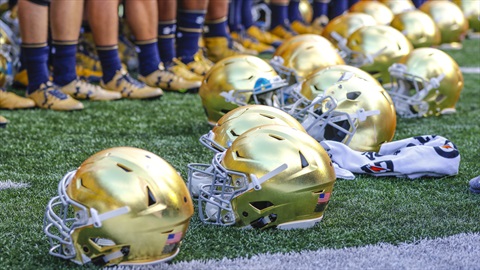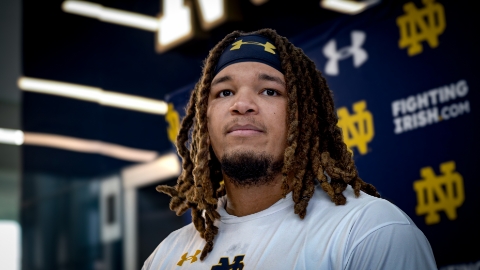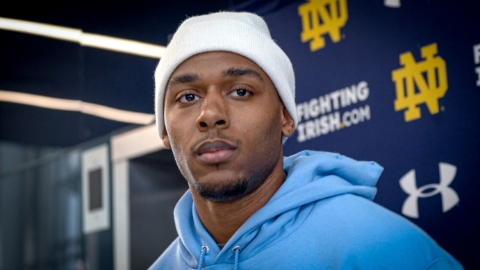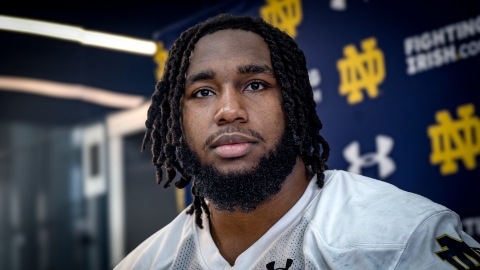Notre Dame QB Coach Gino Guidugli Shares Details of Recruiting Evaluations
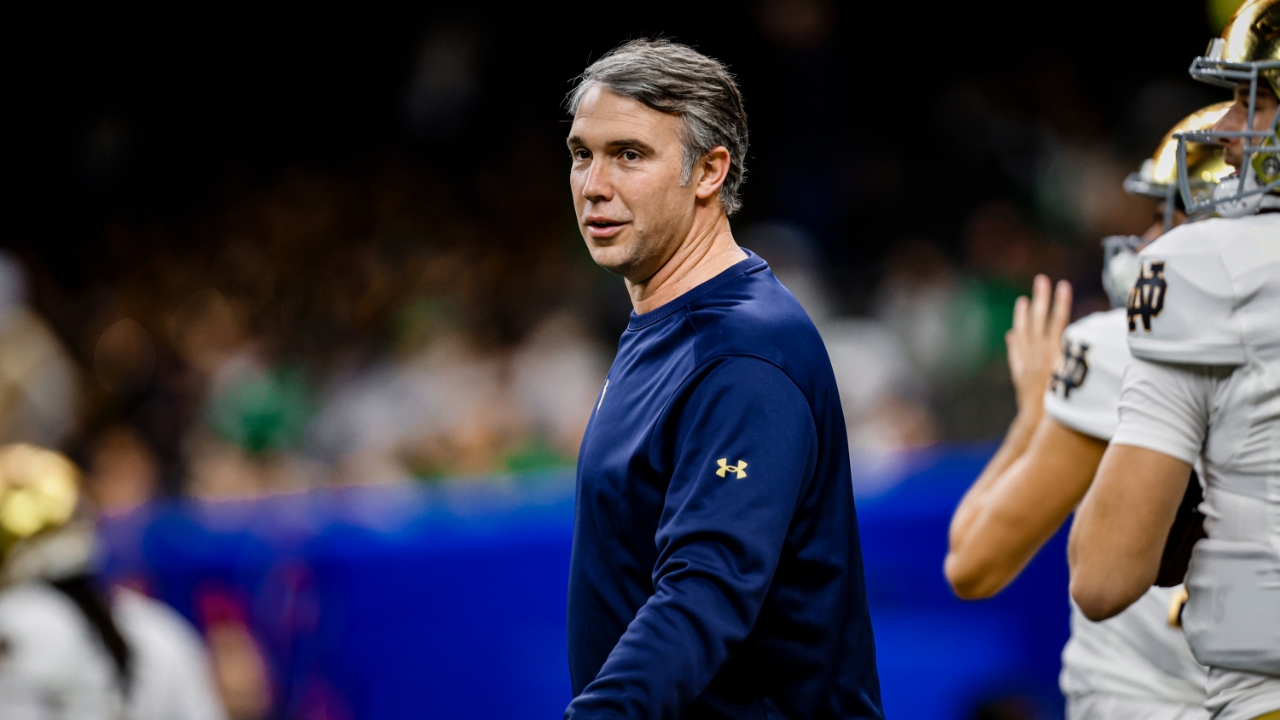
Quarterback recruiting is always a hot topic in college football.
It’s clearly not an exact science.
The nation’s top-ranked quarterbacks routinely bust while you have underrecruited players who find great success. Cam Ward, Shedeur Sanders, Riley Leonard, or even Will Howard come to mind in this year’s NFL Draft class. All four weren’t high-profile recruits but will be selected in April.
Notre Dame quarterback coach Gino Guidugli’s evaluation process starts early. In fact, Guidugli is tracking quarterbacks as freshmen to find a baseline of talent and development.
“You start watching them so young and you’re evaluating kids as freshmen,” Guidugli told ISD. “You’re trying to make an initial judgment on people because recruiting is so sped up.”
When breaking down a quarterback, there are hundreds of avenues to go down. For Guidugli, it starts with mechanics.
As a former quarterback, Guidugli understands it’s hard to change old habits and isn’t big on changing a player's mechanics once they arrive on campus.
“Initially, when I throw on the tape, I’m looking for a guy who is mechanically sound,” explained Guidugli. “I feel by the time I get them, it’s hard to change throwing mechanics. I haven’t had a whole lot of success in my career taking a guy who is somewhat flawed in his mechanics and fixing it. The kid has already had success the way he’s thrown, so him coming to me and trying to change it is an uphill battle.”
The other trait Guidugli looks for in a quarterback is a winning pedigree. Sure, it’s still high school football so the best athletes often shine and win games on talent alone. Yet, it’s also easy pick out a kid like Riley Leonard due to his drive to win.
“You want a kid who is a winner,” Guidugli stated. “You want a kid from a winning program and is used to winning. You want a kid who has played against good competition. Some of those assessments you need to get in person to make. Trying to evaluate arm talent, accuracy and mechanics, you do your best to do that off the tape.”
Once Guidugli builds a list of quarterbacks of interest, the next step will happen, and it’s likely the most important. Live evaluations.
Guidugli will hit the road to watch kids throw live or have them come to camp to put them through various tests and situations. But the live evals also verify size and what he sees on tape.
“My initial list will be the guys who check those boxes,” said Guidugli. “We’re going to go out to see them live to verify if he’s really 6-foot-3. How quick is his arm? How good are his feet? How accurate is he? How strong is his arm in person?
“Sometimes, you can’t get a great read off the tape. I’ve been fooled both ways, thinking this kid does have a strong, and you see him in person, and it’s not what you saw on tape. It’s also the other way around where you think he has average arm strength, and you see him live, and he can really whip it.”
The live evaluations don’t end with a workout. Guidugli will then dive deeper. In fact, he’ll make sure he has conversations with those closest with the signal-caller to gain more knowledge of his makeup.
“The in-person evaluation is as big as anything,” stated Guidugli. “I will get with the head coach and people around that kid to find out the intangible things. Everyone always talks about them, but they’re hard to find by just watching tape. Those come through conversations, being around the kid and talking to his teammates and the coaches in the program.”
Guidugli admits that many of those conversations are the same. There is a baseline of questioning Guidugli has found that works to find out the information needed to offer or not offer a prospect, which also includes testing the mental makeup of the quarterback.
“I have a pretty cookie cutter question and answers I put through each coach or person I come into contact with about those players,” Guidugli explained. “It just compares apples to apples. When I get the opportunity to sit down and talk with the kid and get him on the board, that routine is really the same. When I go back, I can say he did really well on that board exercise, understands football and is doing things in high school that we’ll ask him to do in college.”
The whiteboard work is enlightening at times. Through the years, Guidugli has had top quarterbacks show little to nothing on the board while others have blown him away.
Guidugli doesn’t use it as an end game of sorts, but it’s another baseline in the process. If a prospect isn’t up to par, then Guidugli has more to do in terms of finding out why the player is behind, as that can also be telling.
“Sometimes that kid is behind because the school is behind,” Guidugli said. “He only knows what he knows because someone has taught him that. How well can that kid take in information, retain and execute it? That’s a big part. He can’t control where he goes to high school or what he’s being taught offensively. You have to filter through if you think this kid has the aptitude to take that information and go out and do it.
“I can say, ‘Matt, get on the board and draw your favorite play on offense. Talk me through it like I’m an eighth grader going into high school. I want you to talk to me in as much detail as possible about that play.’ You get a feel for whether he loves football or not. Does he understand defense? Those are things when guys are equal can start swaying in a direction.”
The other hot topic in the world of quarterback recruiting is personal coaches. Every kid has a quarterback coach. Some are great coaches, while some are in it as a money grab or looking for clout.
For every good quarterback coach, there are 10 bad ones, but it’s also the name of the game. Quarterback coaches have become a necessary evil in the game. Guidugli has found a medium and uses the relationship as another data point.
“It’s not an exact science,” Guidugli said. “You have to do your own evaluation mechanically as far as what you’re looking for, which goes back to the No. 1 baseline in that I want someone mechanically sound. You have to know them because many top guys have a quarterback coach in most cases. Those guys are a doorway into that kid and another piece of information.
“The more you get to know those quarterback coaches, the more you get a stamp of approval on whether or not they know what they’re talking about. Kids will get trained. I’m not opposed to it; I’m not for it or against it. I enjoy watching the videos when they’re online because it’s another glimpse of that kid throwing the ball live and closer than the game tape.”
Want the latest scoop on the Fighting Irish? Sign up for our newsletter and become an ISD Premium Subscriber: Sign Up for ISD
Notre Dame Fighting Irish Foul Ball Rope Adjustable Hat

